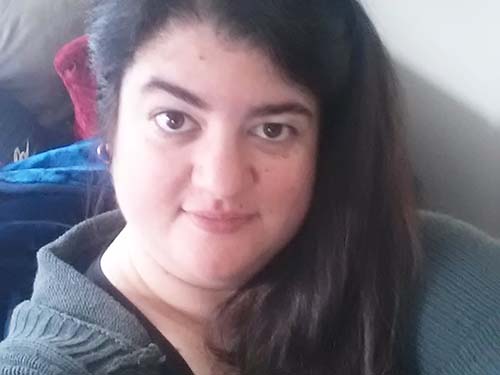
(Posted 2021 November)
Meet Audrey Arnold, ADAPT Volunteer!
How long have you been volunteering? How long have you held this role in Fairfax County?
I have been a volunteer in the ADAPT [Anger & Domestic Abuse Prevention & Treatment] program since September 2014. Prior to volunteering with ADAPT, I had volunteered through and with other organizations, beginning when I was about 12 or 13 years old. I have done everything from tutoring elementary school children, leading vacation Bible school, rehabbing a church on the Navaho Nation, to singing Christmas carols at a nursing home.
Why volunteer? Why volunteer for this specific program?
Volunteering gives me a chance to do something with purpose that is beyond myself. I am able to focus my time and energy on a cause or on a specific population of people for the benefit of addressing a need the community has. It is a gift to be entrusted with helping others, and in the case of ADAPT, helping individuals connect to the best version of who they are.
I chose to volunteer with the ADAPT program because I strongly believe in diversion and alternative sentencing programs. Whenever possible, diversion and alternative sentencing programs should be the first choice by the criminal justice system when implementing a “penalty” on an individual.
Talk about how you overcome the most challenging parts of volunteering.
I never truly thought about challenges being a part of the volunteer work I do, other than the possibility of burnout. I know this is not something many people like to talk about, but it can happen. I have experienced times when I cannot get enough of the work I am doing and other times when I need to reframe my focus back to my own needs. Knowing when to do this is important. I find those who have volunteered for years tend to know how to create this balance while making changes along the way. I would say to anyone who is new, be mindful to do the same in their own lives. Volunteering should be rewarding and not feel like work!
 What is the best part of volunteering? Share your most memorable experience.
What is the best part of volunteering? Share your most memorable experience.
The best part of volunteering is seeing the work being done create a real difference in the lives of the people one is working with and seeing that change take effect in real time.
One of the most memorable experiences I had in ADAPT was working with a client that came into the program, thoroughly not wanting to be in group. The client was wearing a red shirt on that first group meeting and their skin tone was about the same color. I could feel the client’s anger coming through loud and clear, even though it was through nonverbal means. As the weeks went by, the client and I connected on a meaningful level and the client verbalized that knowing there was someone in group who “got” them was allowing the client to keep an open mind. The client truly worked the program, graduated on time. And would you know the gritted teeth turned into a genuine smile and the red face? Gone! The client had a new lease on life and was connected with themself, maybe for the first time.
What has been your favorite training? What did you like about it? What did you learn?
Can I just use this moment to say how much I miss J.D. [Miller, who retired in 2020]? I think I am in good company there! I loved every training I ever took from J.D., but another true stand out was a training Jennifer Perkins did on self-care and core value. It was held outdoors on a sunny Saturday morning. I loved the concepts we covered, the activities we did, and the sense of community we built among the volunteers in attendance that day. I still have the mindful coloring postcard on my refrigerator as a constant reminder of that day.
What advice do you have for people who may be thinking about becoming a DSVS volunteer?
I would say, go to the orientation. It is the best way to learn about the various programs DSVS offers and get any questions answered. Also, the staff are great at responding to any apprehension you may have regarding being a volunteer. Once you have decided what program(s) you want to volunteer in, make sure to make your own self-care a priority. Self-care is a necessity not an option!
What do you wish you could do more of as a volunteer?
I cannot wait until we are able to do ADAPT in person again. I like the ease and convenience of doing virtual groups, but there is something that occurs in the rooms--a vibe, a feeling, the soul--that the virtual experience just cannot fully replicate. Aside from that, and I am sure many can relate, there was a time I wished I were independently wealthy so I could volunteer full time. Although that is not my reality, I recently made a 180-degree career change into the behavioral health field. I know volunteering with DSVS and the ADAPT program were heavy contributors in the decision to finally make that change in my own life.
This article posting is part of the Domestic and Sexual Violence Services' Volunteer Voices monthly newsletter for current and potential volunteers. If you're not already a volunteer, learn how to get involved. Find out about upcoming trainings, volunteer trainings, happenings around the DSVS office and information about articles, books, media recommendations and more.
Learn more about the Domestic and Sexual Violence Services (DSVS).

